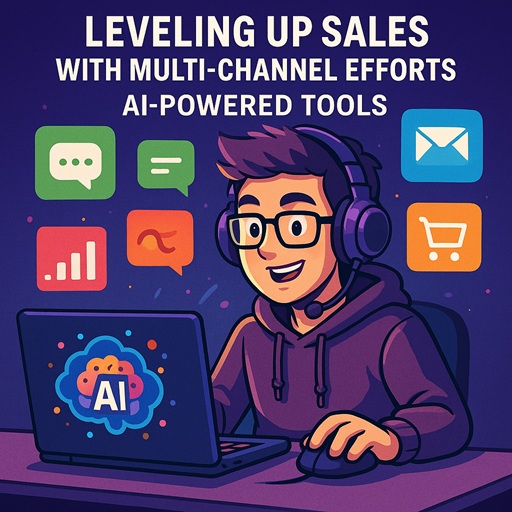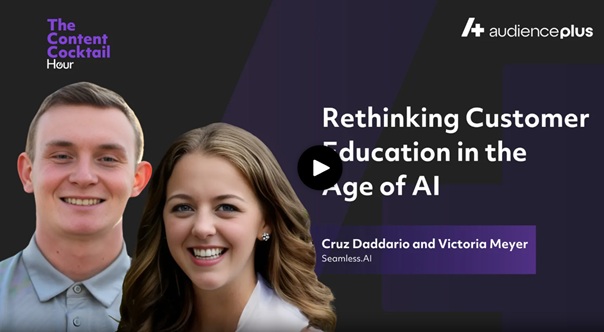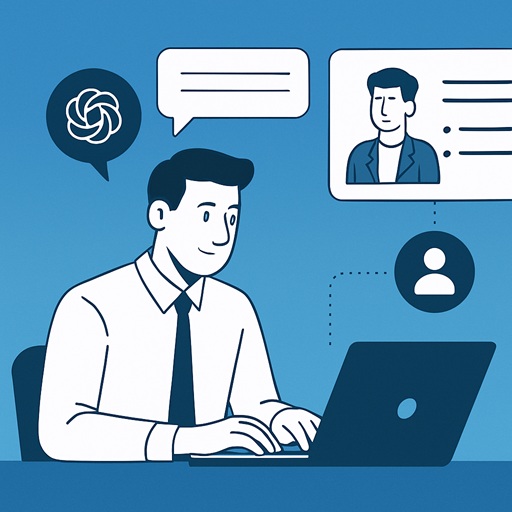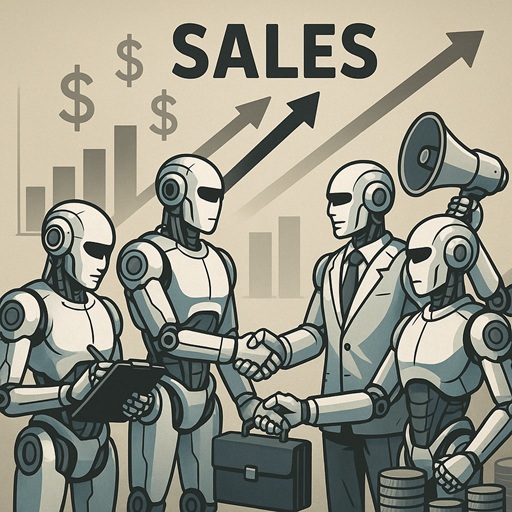If you’ve only used ChatGPT to “roast your SaaS product” or write blog posts, you’re wasting your GPT Plus subscription.
You can use AI for more than just quick copy or an image design. AI is revolutionizing sales prospecting as we speak, but not in the way most people think. Let me break down what actually works, backed by real sales pros who are crushing it with AI right now.
Here’s what you’ll learn:
- Why AI in sales is valuable
- Real-life examples and proof that AI works for sales prospecting
- Actionable tips on how to get started
- Additional resources for continuous learning
Let’s process the data.
(Psst...We're launching the biggest AI in sales survey of 2025.🔥 We want to hear the real story about AI in sales directly from you. If you're ready to take the survey and get exclusive early access to the full report, subscribe to our email newsletter to get notified first.)
The hard truth about sales prospecting
We've all been there–50% of sales time gets wasted on unproductive prospecting.
Why? Bad data, overcrowded markets, outdated B2B contact databases, and the same old sales rejections we've heard a million times.
But here's where it gets interesting: AI isn't just another tool to add to your stack. AI tech can help you work smarter, not harder.
AI can help solve or alleviate the painful thorns of sales prospecting, and turn unproductive prospecting time into more efficient and productive selling that actually gets you closer to your quota targets.
When you use AI to its greatest potential, it’s a win-win. You learn something new, and you become more productive, all while finding better-qualified prospects who actually have an interest in your solution.
📘Related: What is Sales Prospecting
What nobody tells you about AI in sales
Everyone's trying to use AI now - it's table stakes.
But let's get real for a second. Here's the spicy take: most sales teams are doing it wrong. They're trying to automate all the busy work that no one wants to do. But they’re failing to weave in a human element alongside the automation.
As Elisa Montanari, Head of Organic Growth at Wrike, puts it:
"AI has its place in virtually every role, but it's not a blanket solution—especially in people-facing roles that require a personal touch."

The difference between sales pros who really know how to use AI vs. the ones who aren’t using AI to their advantage, is about clearly identifying the nuances and details of the workflow that should be natural, organic, and above all–human.
📗Related: Insider tips on how to use AI for lead generation
The secret sauce: How top sales teams actually use AI
Here's how sales teams are integrating AI into their workflows, and instead of replacing humans, enhancing their efforts. Take a look at what's actually working in 2025.
1. Start with your winners
When it comes to AI, you don’t always have to start from scratch.
Matt Redler, CEO of Za-zu and author of the Cold Outbound Handbook, dropped this simple AI sales hack:
“Take your top SDR's best email or your most effective call script. Look for pieces that require prospect-specific research. That's where AI can help you scale without losing quality.”
Here’s a great example of how Matt and his team did exactly that using AI.

His team crushed it by using AI to generate personalized outreach email messages based on their previous winning emails.
The key? They wrote the email structure themselves - AI just handled the creative heavy lifting.
📘 Related: Sales email outreach templates
2. Pattern recognition that humans can't match
You know how avid sports betting fans use data to predict player performance? Sales teams are doing the same thing with deals.
Smart teams are feeding their AI systems years of deal data - wins, losses, every interaction, every objection. The AI spots patterns humans might miss, like which types of companies close faster or which objections come up at specific price points.
Nishka Sinha, Co-founder and CMO of Dresma, explains how her team leverages this:
"AI helps us dig deeper than basic industry targeting. We look at prospect behavior - email response times, content engagement, even buying signals from their tech stack. This lets us focus on prospects most likely to convert."
Here's a real example that'll make you rethink your targeting: A SaaS company running a beta launch used AI to segment prospects not just by industry, but by digital behavior patterns. They paired this with AI-generated personas that captured typical buying journeys.
The result? Their response rates jumped 25% compared to their traditional campaigns.
The secret sauce? The AI wasn't just looking at obvious stuff like company size. It was tracking things like:
- How quickly prospects opened and responded to emails
- Which content topics they engaged with most
- Their technology adoption patterns
- Social media engagement with industry topics
💡Want to try AI-powered intent data? Try Seamless.AI’s Buyer Intent–the only tool you’ll need for actionable data on active buyers.
3. The Iron Man approach to AI agents
Instead of thinking of AI as a robot replacement, think of it like JARVIS to Tony Stark. It's not taking over - it's amplifying what you're already good at.
Dewey Thompson, Senior Account Executive at Omnisend, advises:
“In sales, where tone and timing can make or break a deal, AI often falls short. People can sense a missing human touch, and they usually don’t like it. If AI is overused for outreach, even technically personalized messages can start to feel generic.”
You can always use AI to help you find a good starting point to your sales outreach messages, but most people can smell BS from a mile away.
Always make sure to craft personalized messages that actually sound like you, or add in a personal anecdote to really show that you’re not just a bot.

All jokes aside, AI can send nice personalized messages on your behalf, but sending something like a handwritten thank you note or a small, personalized “thank you” gift will be even more valuable as more AI is used in sales.
Use your AI agent in sales to do the grunt work so you can focus on adding those memorable touches to your customer relationships.
Here’s what that looks like in practice. An AI agent can:
- Scan earnings calls, press releases, and social media to find perfect conversation starters ("Hey, saw you're expanding into Asia - perfect timing because...")
- Draft personalized outreach that sounds human because it's based on your best-performing messages
- Handle research and data entry while you focus on strategy and relationship building
- Flag deals that match patterns of your past wins
Let AI handle the heavy lifting so you can be more present in actual conversations.
📘Related: How to use AI sales tools for cold calling
4. The Anti-Pattern: What not to do
While AI has countless benefits, John Russo, AI expert and VP of healthcare solutions at OSP, warns:
"Don't implement AI for AI's sake."

Start with a specific problem in your sales process. Come up with measurable objectives, and focus on a specific part of your sales workflow where AI can add value for your team today.
The goal isn't to reinvent your methodology - it's to enhance what already works.
Here's what that means in practice:
- Start small - automate one task like lead scoring or initial email drafts
- Master your prompts - garbage in, garbage out. Learn how to "speak AI" effectively
- Set up clear metrics to measure impact
- Create a feedback loop to improve your AI's outputs
Elisa Montanari from Wrike adds some practical wisdom:
"Break down your workflow in a management platform to track those AI-human handoffs. You need visibility into how AI fits into your existing process."
The biggest mistake? Throwing AI at everything and hoping it sticks. You need a strategy, not a shotgun approach.
5. Learn how to “talk to AI.”
When you’re writing outreach messaging, if you want to get the best results out of AI, you need a strong prompt that’s detailed. The more details, the better. Forget vague prompts - here's how to get AI to do exactly what you want.
- Who's Talking? Tell AI who you want it to be. Sales expert? Industry veteran? Be specific.
- Set the Scene: Give AI the backstory it needs. Think of it like briefing a new team member.
- Clear Command: What exactly do you want? Be direct.
- Format Details: Want bullets? Spreadsheet-ready text? Tell AI upfront.
- Show Examples: AI learns best by example. Show it what "good" looks like. (Technical peeps call this few-shot learning).
Basically, your goal is to be as specific as possible, clear, and provide as much context as you can. The more information AI has to analyze, the better your results will be.
📕Related: Brush up on your AI prompt engineering basics with this in-depth guide on how to talk to AI by David Moore, a GenAI expert.
Here’s an example of what a “bad” AI sales prompt looks like vs a “good” AI sales prompt.
🥱 Mid-Tier Prompt: "Write a cold email to a marketing director about our SEO software."
🔥 Pro-Level Prompt: "Write a cold email to Sam Cho, Marketing Director at Imaginary Company, who recently posted on LinkedIn about their challenge with SEO rankings dropping 15% in APAC markets. Reference their recent partnership with Shopify and how their focus on cross-border payments aligns with our SEO localization features. Use a casual but professional tone, limit to 3-4 sentences, and include a specific question about their APAC expansion plans mentioned in their Q3 earnings call. The email should come from me, John Doe from Seamless.AI, where we've helped fintech companies like Fiktok and Floogle improve regional SEO rankings by 40% in 6 months."
Why the pro prompt hits different:
- Names specific people and companies
- Mentions real pain points and data
- Includes relevant news hooks
- Sets clear tone and length
- Drops impressive stats
- Adds social proof
💡Pro-tip for sales leaders: Create an AI prompt playbook for your team. Train them on this stuff. When your SDRs know how to talk to AI, everyone wins.
Remember, better inputs = better outputs. Simple as that.
Best AI prospecting tools
According to the MongoDB CEO, if the current AI boom is like the dotcom boom era, it is 1996.
Basically, we’re at the start of something massive, but most people don’t realize it yet. Think back to the dotcom era: clunky websites, slow internet, and no one really knowing how big the internet would get.
That’s AI right now. It’s early, it’s raw, and it’s full of potential.
The big players haven’t fully figured it out, and the winners of this AI “gold rush” are still emerging. If you jump in now, you’re basically getting a front-row seat to the next tech revolution.
There are new AI tools and features advancing faster than you can even say “artificial intelligence.” So what’s worth investing in, and what can you pass on?
We’re still in the early stages of AI tools and development, but the key to getting in early is to get familiar with current AI tools, especially AI for sales prospecting, lead generation, sales outreach, and more.
Here are some notable AI sales prospecting tools you’ll want to try (+ a few that are free to use!):
- Seamless.AI: Find freshly researched B2B contact leads in seconds. (learn How Apollo compares with Seamless.AI or How Lusha compares with Seamless.AI)
- Clay: AI research agent for data enrichment.
- Artisan: Your very own AI “employee” that acts as a mini BDR.
- Claude: For all your sales writing needs.
- CoPilot AI: Focused on using LinkedIn for sales prospecting, engagement, and conversion.
📘Related: Want to explore more AI sales tools? Get this curated list of 25 Top AI Business Tools
Finding your sweet spot with AI sales prospecting
AI in sales prospecting isn't about replacing humans or automating everything. It's about augmenting your natural abilities and freeing up time for what matters - building genuine connections with prospects.
Want to get started? Look at your current workflow and identify the manual, time-consuming tasks (like prospecting, list-building, data enrichment, or monitoring buyer intent) that don't require your human touch. That's your AI sweet spot.
Remember: The best salespeople aren't being replaced by AI - they're the ones leveraging it to outperform everyone else. Now go crush those quotas.
















